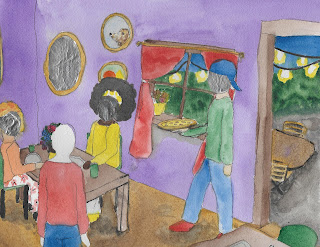I feel like most of my blog posts exist in the tension of "what do we do in the in-between?" This one isn't going to be different.
We are in a world where LGBTQIA+ kids are at risk of harm, homelessness, and harshness when they come out to their communities. We have a responsibility as teachers to protect the children we teach to the best of our ability. These are our realities. But do they have to be? My tension point on this topic is: how do we create a new way to handle protecting our kids that does not involve alienating them from their families and communities? How do we make these communities a safe place where they can receive support instead of discrimination?
Kids need support. They are learning how to be humans from scratch and it isn't easy. They need guidance, they need to be affirmed, they need to be strengthened to be ready for a world that is full of hard things, and they need to be surrounded by beauty to see that this hard world is still a good one. In an ideal world, this support comes from families and is supported by the school environment. But especially with this issue, it seems like schools are participating in severing these ties instead of strengthening them, reversing the roles that best benefit children and perpetuating the struggles these children face instead of resolving them.
This makes sense in some ways, especially since Rhode Island law demands that teachers respect the privacy of students. It requires teachers to let students take the lead on coming out to their communities. But is also expects teachers not to communicate with families that their child is going through what can be a difficult process, and I have to wonder if this really is in the best interests of children. It seems to keep them from the support their families can provide should their families be informed of what their children are exploring.
It is definitely true that not all families are supportive and that this law has the intention of protecting children from families that will respond to their child coming out by beating them or kicking them out. Still, I have to wonder if this is the majority of families and if we might be participating in this response by facilitating secrecy instead of communication and connection. When secrets are leaked, there are explosions. Parents taken by surprise lash out instead of connecting because they feel betrayed. This worsens the problem, it doesn't make it better. What if schools took the lead on facilitating conversations and minimizing the shock factor for families and providing external accountability that would limit a parent's ability to harm their child? What if we believed in our families and held them to a higher standard instead of withholding the opportunity for them to support their children?
There is growing tolerance, even if the growth is slow, but are our methods of handling these situations matching this growth or remaining in the past? How can schools be proactive instead of reactive to culture, facilitating the strengthening of bonds to increase the safety of kids who come out? How can we facilitate spaces where families can be more comfortable with accepting their children and supporting them?
As I mentioned, we are in the "in-between." These kids aren't accepted quite yet, although that is becoming more normal. We can't just "out" them and expect that to be ok - there are real dangers involved. But is it actually ok to also facilitate secrecy between students and what should be their strongest support in life? How can we can get ahead of this issue instead of running behind and trying to pick up broken pieces as they appear? How do we facilitate wholeness to support students and their families and provide a new way for safety that isn't secrecy?

.jpg)



Beautiful questions... and asking them will always help you be the best ally and partner with your students and their families. Every case is different. You CAN follow the law and your moral compass at the same time.
ReplyDelete